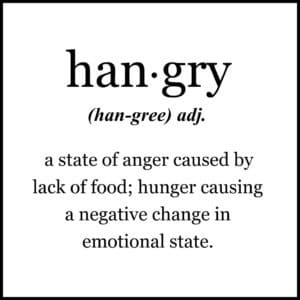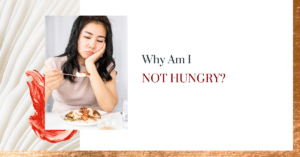Why Do We Get Hangry? The Science Behind The Emotion.


Have you ever been overdue for a meal, and felt anger, restlessness, or anxiety? Then you’ve experienced hanger: hunger + anger. This is such a common occurrence that the term “hangry” was coined. While it is a catchy expression, I was curious: is there actually any science behind this phenomenon? Or is it just an excuse to take out your frustrations on your friends or family?
Hormonal Control
Two main hormones regulate our bodies’ metabolism: insulin and glucagon. When we digest food, carbohydrates are broken down into glucose. The glucose is then transported into the blood stream, which triggers a release of insulin from the pancreas. Insulin helps to transport glucose from the blood to our cells, thus supplying cells with energy to function, while bringing our blood glucose levels back to baseline.
But what happens when we are hungry? If you haven’t eaten in awhile, the glucose level in your blood dips, signaling the pancreas to secrete another hormone: glucagon. Glucagon breaks down stored glucose, and releases it into the blood to bring blood sugar levels back to baseline. But this stored glucose only goes so far. If you don’t eat something soon: cue hanger.
The Science is Real
According to Dr. Brad Bushman, a professor of communication and psychology at Ohio State University, anger and aggression start when self-control stops. As he explained in an interview with the Huffington Post, the pre-frontal cortex of the brain regulates self-control, and it needs energy in order to do this properly. That energy comes from the calories we eat. Fun fact: while our brain makes up only 2% of our total body weight, it uses anywhere from 20-30% of the calories we eat in order to operate at peak capacity. In short: if we don’t eat enough, our brain doesn’t function as well. This leads to a loss of self-control and more aggressive (or angry) behavior.
How can you prevent it?
Now that we know the science behind our hanger, here are some ways to keep your blood sugar levels stable throughout the day. Your brain (and your friends and family) will thank you.
- Don’t skip meals. Eating on a regular basis is key to keeping blood sugar stable. Have a busy day and not sure when you’ll be able to eat? Bring snacks along with you, and include foods with a balance of protein, complex carbs, and fat. Try an apple with peanut butter, dried fruit and nut trail mix, cheese and crackers, or a sandwich or granola bar.
- Pair carbs + protein + fat. Carbohydrates give your brain fuel (and prevent that hangry feeling) while protein and fat help to slow digestion and stabilize your blood sugars. Balanced meals that include all three food components will help to keep your blood sugars steady and prevent mood swings.
- Include sources of fiber. Fiber is digested slowly, helping to keep you full for longer. High fiber foods such as whole grains, fruits, vegetables, nuts, seeds, beans and lentils not only will help keep you full but they’ll also help to regulate your blood sugar, preventing highs and lows.
Looking for intuitive eating support?
Check out my Unapologetic Eating 101 Course, an online, self-paced program to liberate yourself from dieting and make peace with food and your body.
My team and I also offer virtual one-on-one support – you can check out our virtual intuitive eating nutrition coaching packages.
My book, Unapologetic Eating: Make Peace with Food and Transform Your Life, is also a great resource that includes information, research, and reflection prompts to help you move away from dieting and come back home to your body, so you can live your most unapologetic, liberated life.
This post was written by Selin Sahin, a nutrition student at New York University and an intern at Alissa Rumsey Nutrition & Wellness. I reviewed and edited the post for content.
Author Bio
This article was written and reviewed by Alissa Rumsey, MS, RD, CSCS, a registered dietitian and Certified Intuitive Eating Counselor. She specializes in weight-inclusive care, intuitive eating, body image healing, mindfulness, self-compassion, and healing from chronic dieting, disordered eating, and eating disorders. Alissa holds a Bachelor’s Degree in Nutrition and Exercise Science, and a Master’s Degree in Health Communications, and is also an NSCA Certified Strength and Conditioning Specialist.
share the love

about
Alissa Rumsey, RD.
Alissa Rumsey, MS, RD, CDN, CSCS (pronouns she/her/hers) is a registered
dietitian, nutrition therapist, certified intuitive eating counselor, and the author of
Unapologetic Eating: Make Peace With Food and Transform Your Life. Alissa is
passionate about helping people reclaim the space to eat and live,
unapologetically.

A twice-a-month round-up of inspirational stories, lessons, practical tips and encouragement for living your most authentic, unapologetic life.
The Unapologetic Life
RECENT POSTS

The Unapologetic Life
A twice-a-month round-up of inspirational stories, lessons, practical tips and encouragement for living your most authentic, unapologetic life.










